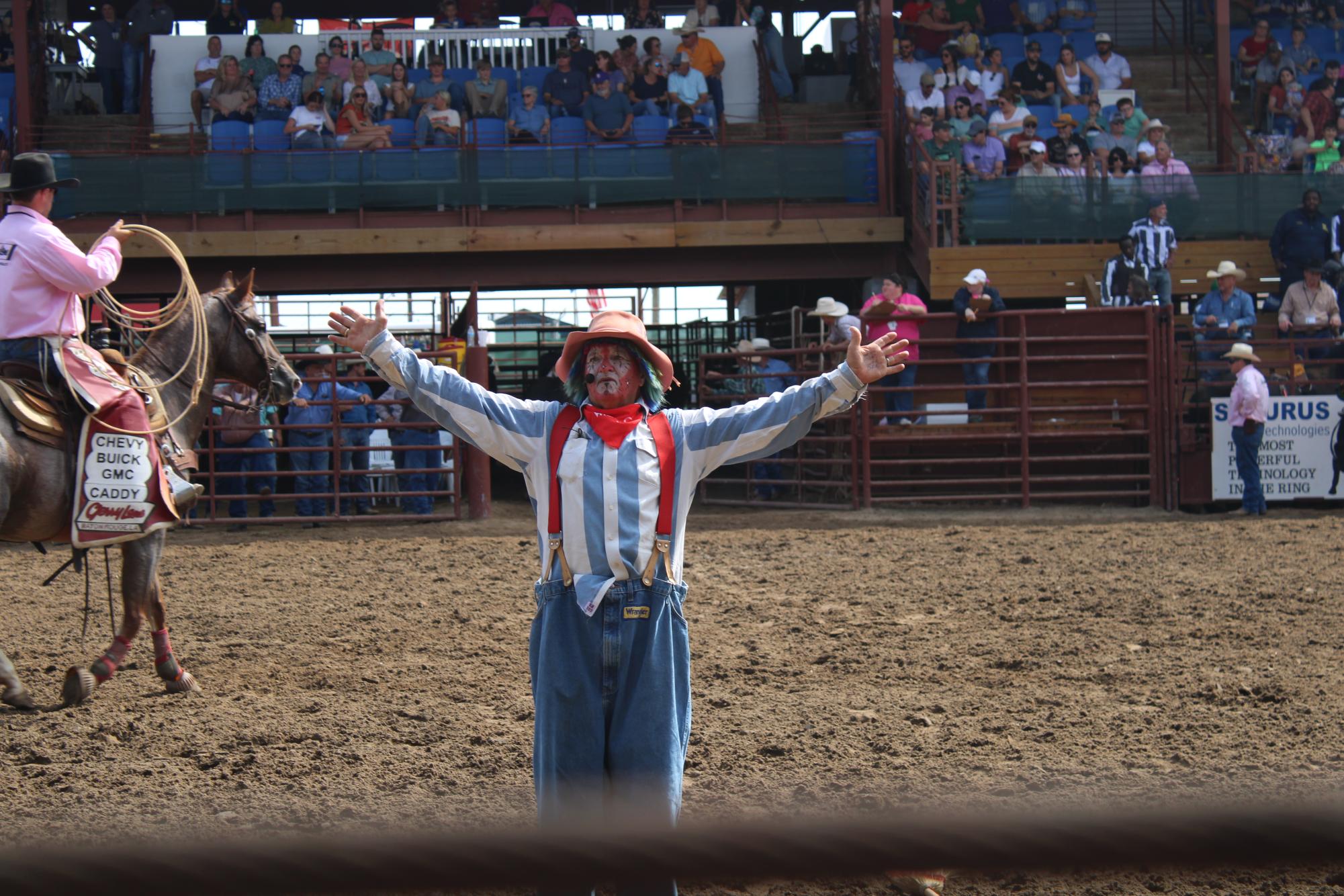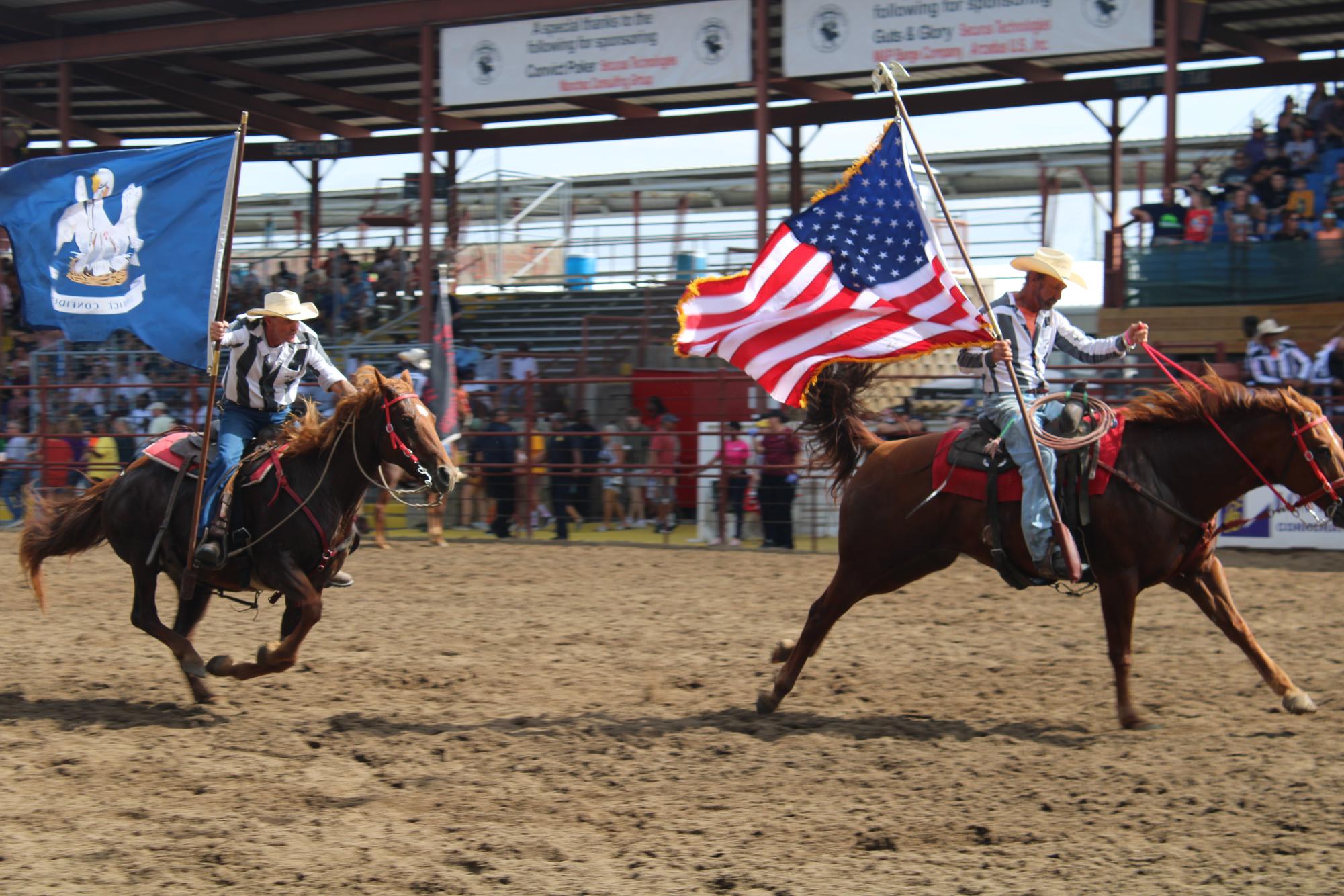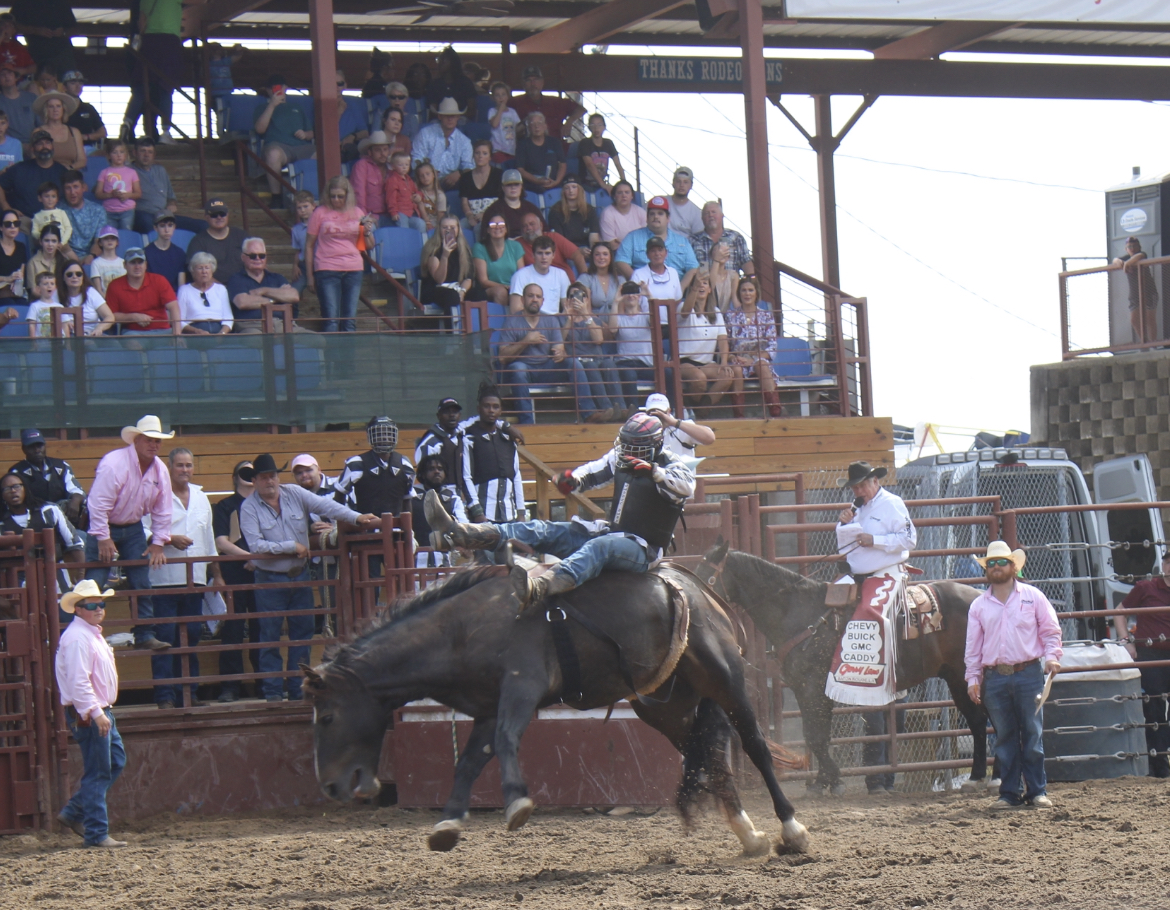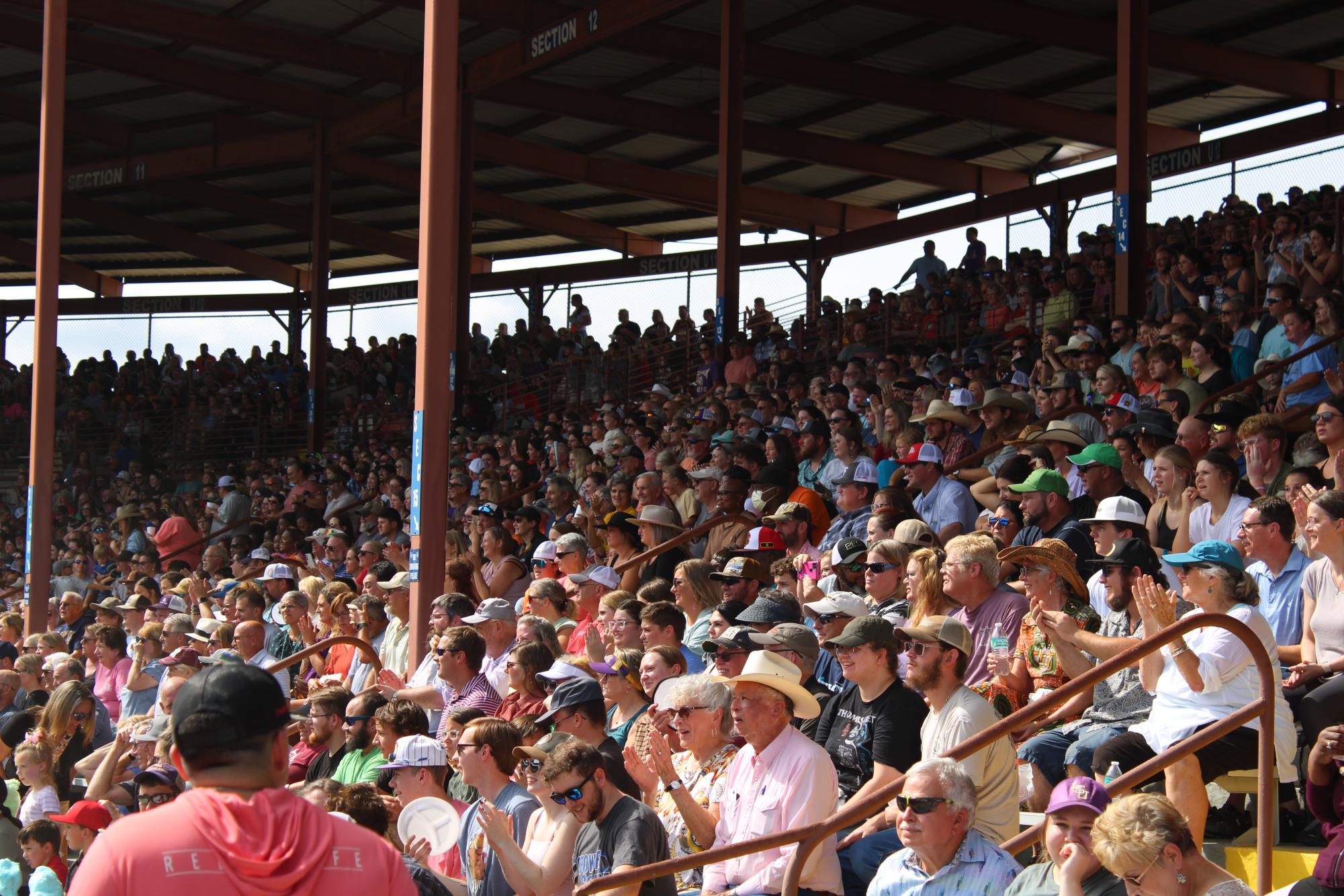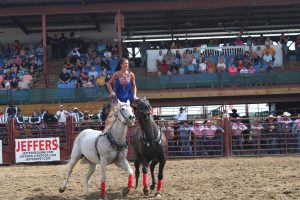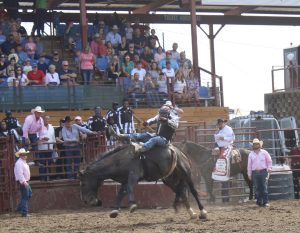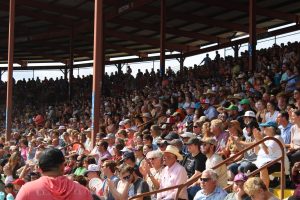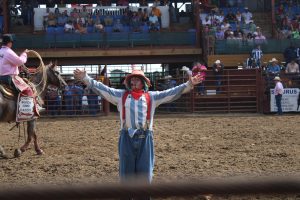A broken arm, torn ligaments and a life sentence cannot stop Myron Smith. He is a Louisiana cowboy.
This is Angola Prison, where Smith serves for first-degree murder. An hour northwest of Baton Rouge, past church signs that flash “Jesus didn’t come to condemn,” over rolling hills and forested ravines, Louisiana Highway 66 reaches a dead end just before the Mississippi border.
The land is a former slave plantation. Named after the country many of its slaves originated from, Angola is the largest maximum security prison in the United States. It houses nearly 5,000 prisoners, about 85% of whom are serving life sentences on the 18,000-acre plot of farmland.
Since the 1960s, every Sunday in October Angola has turned into a Wild West-style rodeo.
The two-lane highway leading to the prison is packed with motorists seeking a form of entertainment likened to the days of Caesar. For $20, thousands of visitors flock to rural Louisiana to witness the “The Wildest Show in the South.” Formally known as the Angola Prison Rodeo, prisoners compete in traditional rodeo events like bull riding and bareback riding — and also some unconventional and even gruesome competitions.
Smith has competed in the rodeo since 2006. “I have a lot of excitement and adrenaline for this stuff,” he said. “It’s an adventure.”
On one October Sunday, Smith summed up his pregame feelings with one word: “hungry.”
Smith’s favorite event is the finale, “Guts and Glory,” where prisoners compete to grab a poker chip tied to the forehead of a confused and enraged 2,000-pound bull. He’s won the event 21 times. He also competes in “wild cow milking,” where two teammates try to restrain a bull while Smith attempts to retrieve a dollop of milk for the judges.
During the rest of the year, he works on the prison farm, cutting grass. At the rodeo, he can make anywhere from $200 to $2,000, an exorbitant amount of money in a place where prisoners typically make about 2 to 75 cents an hour. Smith said he sends the money home to take care of his kids and grandkids.
Another hardened participant of the rodeo is lifer Travis R. Johnson, known among Angolites as “Buckethead,” a name he explained was earned through “doing small stupid stuff.”
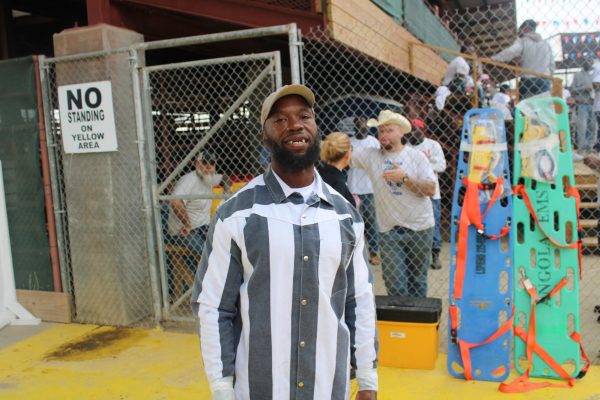
Johnson has competed in the rodeo for the last 20 years. The first few were not easy.
Because the prisoners do not get any instruction for the games, “it’s been on-the-job training right here in the arena,” he said. “I’ve had a lot of losses to learn how to win.”
When Johnson isn’t dodging bulls, he’s breaking horses. Johnson is one of Angola’s cowboys. He said he’s found his passion in the work. Some of the horses being used in the rodeo, he has trained himself.
“If you go by my bed and look under my mattress the first thing you gon see is a horse trainer magazine. Or you reach this way you go see a book because I study,” Johnson said. “I always want to get better.”
Despite its popularity among competitors, many believe the rodeo is exploitative: a cruel, barbaric, warped form of entertainment. Every event is volunteer only but can be extremely dangerous.
“Convict poker,” for example, involves four prisoners sitting around a red table ostensibly playing a game of cards. Suddenly a bull is released into the arena. The man with the nerve to stay in his chair the longest wins. After the dust settles, it’s not unusual to see a few inmates carried out on stretchers.
Warden Tim Hooper sees it differently. “It gives them an adventure,” he said, shooting a suspicious glance from his golf cart. “It gives them something to look forward to.”
It’s also a way to maintain law and order during the rest of the year. Only the well-behaved prisoners have the chance to compete in front of thousands, walk among civilians and meet family and friends in person.
Under the guise of safety, inmates wear padded vests and helmets resembling those worn by hockey players. As for the medical attention, “I got the best paramedics and the best doctors,” Hooper said. “If I was gonna have a heart attack, this is where I’d want it to happen.”
For inmates endowed with less chutzpah, the rodeo offers a chance to sell arts and crafts and raise money for themselves and prison programs. Many spend the entire year preparing for the event, constructing furniture, crafting leather wallets and painting everything from kitschy LSU gameday art to surrealist African folk portraits.
The more disorderly, sex offenders or recent tenants who have not proven reliable to mingle with the general population can still showcase their compositions. Their galleries just happen to be behind a row of steel bars.
For the past four Sundays, New Orleans native Morlon Newman has stood outside a tent selling teddy bears. So far this fall, Newman said he’s made three to four thousand dollars. Six foot two with a bulky build and tattoos, Newman, aka “Flash,” doesn’t look like the typical stuffed animal salesman. The other six days of the week he’s serving life for first-degree murder.

For Newman, who has been in Angola for 28 years, the rodeo is a chance to raise money for his drug rehabilitation program. Up until a few years ago, he struggled with addiction and contemplations of suicide.
Then, “March 15th, 2018, I had an encounter with God,” he said. “And he took the drugs away from me, and since then kind of put it on my heart to help people who are like me.”
Newman pointed to another guy selling teddy bears, “I moved him in a dormitory with me and kind of nursed him back to health. And then from there I just started grabbing other guys and started having support groups and education building.”
After talking to the warden and gaining a seminary degree, he has structured a 90-day rehab program. Newman now has 30 additional mentors, all of whom are former drug addicts who went through the program.
Luther McFarland sells barbecue pits he learned to make from the prison’s welding program. He’s been in prison for the past 19 years.
“This is my passion,” McFarland said, and he now teaches other inmates to weld. He plans to use his revenue to buy more barbecues and pay for paralegal courses.
With an often sold-out 10,000-person arena, the prison nets about $200,000 per weekend in ticket sales. Along with food and merchandise, the event can generate millions of dollars a year. Much of that revenue funds the prison’s 14 vocational training programs.
Outside the arena, a local car dealer hands out free merchandise. He employs dozens of former inmates, many of whom he said are key employees. One former lifer, released on parole for good behavior, came back to the rodeo with his wife and grandchild to visit his former correctional officers. He credited the vocational and rehabilitation programs for his success.
“They leave here with the ability to make 60, 70, 80, $100,000 a year, which was a pipe dream for them before they came in here,” spokesperson Ken Pastorick said.
Yet when anyone asks the Louisiana Department of Corrections to interview prisoners, they will invariably be shown success stories. When the communications department hovers around, prisoners respond in a bubbly fashion to questions about what life is like on the inside.
But Angola did not achieve the epithet “America’s bloodiest prison” by selling teddy bears. The reality is darker.
The vast majority of inmates work in fields harvesting wheat, corn, soybeans, cotton and milo, while underpaid prison guards, often with a penchant for violence, oversee the work. Sometimes the guards are accompanied by wolf-dog hybrids. With nearly 75% of the prison population being Black, it takes little imagination to understand why the penitentiary has been compared to modern-day chattel slavery.
This past summer, Angola made headlines for locking juveniles, some as young as 14 years old, in cells without air conditioning for several days. Heat indexes in the surrounding area reached 133 degrees during that time. And in 2020, Angola made national headlines for ignoring COVID-19 policies, despite pleas from inmates. Their current medical director served in federal prison for buying $8,000 worth of methamphetamine in a Home Depot parking lot.
The rodeo’s financing has not always been transparent. A 2017 audit revealed that $6 million of revenue from the rodeo between 2014 and 2015 was not deposited with the Louisiana State Treasury or DOC budget, violating the state’s constitution.
But at the rodeo, the darkness is not evident. Amid the artwork and hobby craft, one prisoner proudly posed for pictures while children pet the service dog beside him. In the background, an inmate band played Neil Young’s “Keep on Rockin’ in the Free World.” The atmosphere was jovial. Inmates talked with guards and civilians. During the rodeo, they laughed and cheered each other on.
Despite its notoriety, despite being in a state with the highest incarceration rate in the world and despite uncertainty around the repeal of recent criminal justice reforms, hope still prevails in Louisiana State Penitentiary. Inmates like Newman can lift others out from valleys of despair.
Jeffrey Hillburn, a lifer and editor of The Angolite, the inmate-run magazine, explained what seemed to be a common thread among Angola’s success stories, a philosophy he’s learned from 33 years as a writer in prison:
“If I do right every day, and if I get up and I help people, then that door gets opened a little bit more,” he said.
Other states are looking at Angola’s pilot program, launched in 2010, where lifers serve as mentors for nonviolent offenders, teaching them job skills and morals to prepare them for life outside. In Oklahoma, the DOC is advocating for a $9.3 million plan to revive their own rodeo, which shut down in 2009.
Before “Guts and Glory,” Smith and Buckethead turned back and cheerfully gave a thumbs-up. This was their time to shine. Two seasoned veterans of the Super Bowl for the institutionalized, ready to seize a bounty worthy of Angolite aristocracy. In the end, while other prisoners hung on the outskirts watching timidly, Buckethead valiantly plucked the poker chip from the bull’s forehead to the chorus of 10,000 roars.
The rodeo has taught Buckethead determination and responsibility. He views it as a way to earn money the right way. “When I lay down I can feel good,” he said. “Because I went out and tried to earn my money. And I know I can take that with me wherever I go.”



